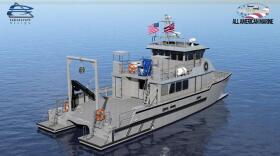-
Humpback whales use “bubble nets” to catch krill, which researchers have determined to be an example of tool modification and understanding. That’s following a new Royal Society Open Science article on the whales that included University of Hawaiʻi researchers.
-
New research shows that marine protected areas are paying off in the long run. A team of researchers from the Hawaiʻi Institute of Marine Biology found that healthier reefs in those protected areas attracted bigger fish.
-
Scientists are figuring out the mysteries of an ocean phenomenon known as reef halos. The halos were first discovered in the 1960s and scientists have been studying the images for coral reef health. Their research shows that reef halos are a sign of a healthy reef ecosystem.
-
The Hawaiʻi Institute of Marine Biology is preparing to welcome a new multipurpose research vessel. Once complete, Imua will be able to conduct a wide range of research projects — from seafloor mapping to deploying equipment like buoys.
-
Hawai‘i researchers have successfully grown a tropical sea urchin from a cryopreserved embryo — a promising first for ocean science. University of Hawaiʻi graduate student Charley Westbrook spearheaded the project. He created a bank of cryopreserved urchin embryos, then thawed the specimens months later.
-
An international group of researchers including a biologist from Hawaiʻi discovered a way to genetically diversify coral to help them adapt quickly to climate change.
-
Marine biologists based out of Kāneʻohe Bay are working to save the world's coral species using cryopreservation, a technique that involves storing coral genetic material.
-
Local marine biologists say Hawaiian blue rice coral may reveal important clues as to how some corals might weather climate change. New research from the Hawai‘i Institute of Marine Biology and the Smithsonian Conservation Biology Institute takes a closer look at this phenomenon.
-
The drastic reduction in visitors coming to Hawaii has afforded scientists a unique opportunity to see how one of the state’s most popular natural…
-
Evidence from the Hawaii Institute of Marine Biology shows that corals are already naturally adapting to higher temperatures. But the rate of increase may…
Play Live Radio
Next Up:
0:00
0:00
Available On Air Stations










